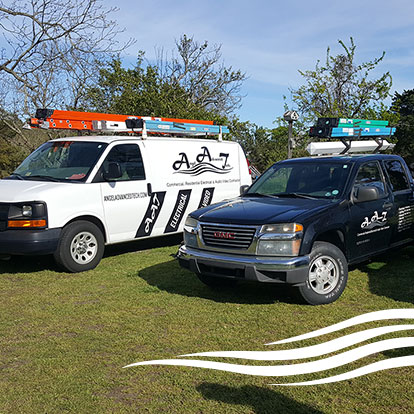
Electric Car Chargers in Kitty Hawk
Install a Home Charging Station for Your Electric Car in Nags Head
Angel Advanced Technologies is devoted to providing homeowners with top-of-the-line equipment to make their lives more convenient. One of the ways we achieve this goal for EV owners is to install EV charging stations. Our electric car charger installations are fast, accurate, and affordable.
Level 1 Vs. Level 2 EV Chargers
The majority of electric vehicle charging is conducted at home. Many EV owners find themselves frustrated by the slow speed of Level 1 chargers, which are the cables that come standard with the purchase of an electric vehicle. A Level 1 charger plugs directly into a standard 120-volt AC outlet and has an average output of 1.3kW to 2.4kW. These chargers only provide 2 to 5 miles of range per hour, which means only 30 to 50 miles of range is added during an overnight charge.
The simple and cost-effective solution is to install a Level 2 charger. Level 2 charging stations operate on 208-240 volts and output between 3kW to 19kW of AC power. This translates to 18 to 28 miles of range, meaning an EV battery can reach full charge in only 8 hours. Level 2 chargers require additional installation and infrastructure, including a professionally installed 240-volt outlet on a dedicated circuit.
Maximize Your Electric Car's Efficiency with a Level 2 EV Charger
Level 2 electric vehicle (EV) chargers provide faster charging times and increased convenience compared to Level 1 chargers. With a Level 2 charger, you can fully charge your electric car in just a few hours, rather than the 10-12 hours it takes with a Level 1 charger.
At Angel Advanced Technologies, our experienced electricians can install a Level 2 EV charger in your home or business in Point Harbor or the surrounding areas. We can also assist with selecting the right charger for your needs and ensuring that your electrical system is properly configured to handle the increased demand.
Benefits of upgrading to a Level 2 EV charger include:
- Faster charging times
- Increased convenience
- Greater range flexibility
- Reduced charging costs
- Improved overall efficiency
Don't settle for slow charging times and limited range. Upgrade to a Level 2 EV charger today and enjoy all the benefits of driving an electric car.
Benefits of Installing an Electric Car Charger at Home
With the increasing popularity of electric vehicles, having a home charging station can offer numerous benefits for electric car owners. Installing an electric car charger at your home can provide convenience, cost savings, and environmental benefits.
Some of the benefits of installing an electric car charger at home include:
- The convenience of charging your car overnight at home
- Cost savings compared to public charging stations
- Reduced reliance on gas stations
- Environmental benefits of reducing emissions
- Potential increase in home value with added charging infrastructure
Our team at Angel Advanced Technologies can help you assess your home's electrical capacity and recommend the best electric car charger solution for your needs.
EV Charger Installation Requirements
Prior to installing an EV charger at a residential property, homeowners must determine whether they meet the requirements for such an installation. First, the home must be owned by the person desiring to install the EV charging station, or they must receive permission from their landlord. Second, the residence must have off-street parking, such as a driveway or a garage. Finally, if the charger is a smart charging station, the home needs to have Wi-Fi access to fully benefit from all the charger’s features. Smart charging allows users to manage their charging points remotely and optimize their energy consumption.
For help with everything related to electric car charger installation in Kitty Hawk, turn to the experts at Angel Advanced Technologies. We perform quality work that stands the test of time.
Is Charging an Electric Car at Home Cheaper Than Gas?
While EVs are certainly better for the environment, most drivers are attracted to them because they will no longer have to pay for gas. Although EV owners still need to pay for electricity to charge their vehicle’s battery, this is significantly less expensive than fueling up with gasoline. This is especially true in North Carolina where the average electric rates are 12 cents/kWh. If a driver does 14,000 miles a year, which is about 38.4 miles per day, it will cost about $50/month or $600/year to charge an electric vehicle at home with a Level 2 charger. Considering the average American pays more than $1500/year on fuel, the savings on gas adds up quickly.
To request a free estimate for electric car chargers in Kitty Hawk, call Angel Advanced Technologies at (252) 306-3103.
Committed to Total Customer Satisfaction
Testmonials


-
"I continue to be delighted by the service provided by AAT."- Frank S.
-
"I would highly recommend Angel Advanced to the for any electrical work, installation of surround sound systems and other services."- Ron G.
-
"They do wonderful work!"- Happy Customer
-
"I HIGHLY recommend Matt and his crew. No need to look further. This is the company to use."- Reid Z.